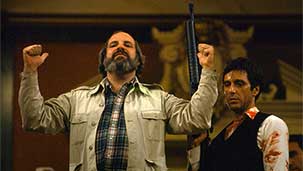We met once, you and I. On the island of Nantucket to be exact.
Anyone waiting for a limerick will be sadly disappointed.
I was there for a festival where you were screening The Good Night. You seemed genuine and thoughtful –and pretty chuffed when my friend and I mentioned we’d noticed Jarvis Cocker had a small part in your film. I left the conversation thinking that, notwithstanding your family connections, you had managed to stay pretty grounded. The Good Night, on the other hand, despite a strong cast and some interesting moments, didn’t make much of an impression at all.
Your second film, Young Ones, is an exercise in a kind of plot/concept heavy storytelling that while effectively executed, also left me cold. At the time I couldn’t think of a useful comparison to you as far as other filmmakers went. But now that I have seen De Palma, a documentary you and your fellow New Yorker Noah Baumbach directed, it’s easy to see at least some similarities.
I kind of hate Brian De Palma films, often for the same reasons I tend to dislike Baumbach’s work and find your output inaccessible—because they read as exercises in filmmaking technique, rather than a fully realized film. And they often seem to contain an undercurrent of disdain for the characters that inhabit them—as if they are nothing but mannequins to push around a stage.
So watching a documentary about De Palma that essentially consisted of him narrating a clip show of his greatest hits was a bit of a slog. Particularly because it was punctuated with his incessant tendency to remind us of his relationships with Coppola, Spielberg, Scorsese and Lucas. All of whom, in one way or another, are more successful filmmakers. And in that I mean creatively, rather than fiscally.
The best of De Palma’s work (Scarface, Blow Out or even the mediocre Untouchables) all suffer from the same disqualifying flaw—we never feel any real depth of character, any genuine emotion, amongst the often technically proficient filmmaking. It is Kubrickian without the intellectual underpinning, and is inevitably an exercise in empty calories.
As De Palma unspools, it touches upon the entirety of his creative output—from film school until the present—chronologically. I was a bit baffled at the creative choices involved: it is just a one shot of him talking about the films and his process (occasionally intercut with some old home movies and other period footage) while clips of his movies are used to illustrate a particular anecdote or simply to demonstrate technique. The whole film felt barren and kind of reductive. Although an argument could be made that your modest creative choices underlined De Palma’s claim to fame—his technical innovation. Still, De Palma was visually uninteresting and kind of dull.
De Palma is an unadorned, largely positive look at his filmography—with occasional references to his creative legacy as well as annotating his influences (Hitchcock, Hitchcock and of course, Hitchcock). That you feel Brian De Palma is an important part of the seventies renaissance in American filmmaking is clear, and your reverence for his work is obvious.
For my part, I would rather watch Scorsese’s Taxi Driver and be reminded of how visual style _and depth of character can exist in a singular vision.
Sincerely,

Tim






